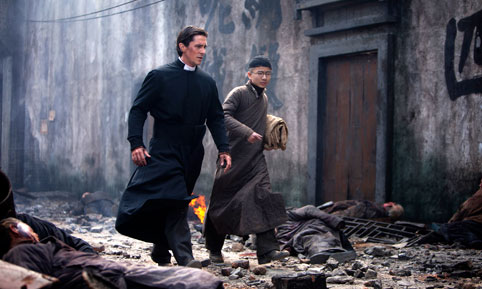
Today (18 February), the Berlinale is bidding farewell to the legions of stars, directors, critics, film buffs and fans, following the awards ceremony in which no less than eight of the 18 competing films won awards, which speaks volumes about how evenly matched many of the films were. And while critics, on the whole, weren't blown away by the selection, there were some solid films and deserving wins, nonetheless.
The awards ceremony was hosted in the Berlinale Palast, the festival's most prestigious venue, with the mandatory red carpet, and a bilingual presentation by German actress Anke Engelke. A far cry from the movie theatre where journalists grouped to watch the wrap-up ceremony via a live feed.
The coveted Golden Bear award - unsurprisingly - went to the Italian prison docudrama Caesar Must Die, by veteran directors Paolo and Vittorio Taviani. The directors spent six months making the film inside Rome's maximum security prison, Rebibbia, following the staging by inmates of a performance of Shakespeare's Julius Caesar. The impromptu actors, many of whom are serving life sentences, comment throughout the film on how the play feels relevant to their own experiences, and how they used those experiences to bring something raw, deep and human to their roles.
The film had a social message, too, as the directors explained; 'We gave [the inmates] the option to use their real names in the film, and they all wanted to. Most of them have been imprisioned for a long time and will still be there for many more years, and they realised this film would be a way to show people, to show their friends, like 'I'm still here, I'm still alive'. We figured this was a way to bring to the media, and the people's attention, the state of Italian jails, and the conditions these humans live in. They might have done some tragic things, but they're still human.' The Taviani brothers manage to probe, in an artistic way, a heavy, and little-discussed, social issue.
Portuguese cinema was also in the spotlight this year with portuguese director João Salaviza winning an award for Best Short, and Miguel Gomes, director of Tabu, winning the Alfred Bauer Award, awarded for a work of particular innovation. Both directors commented on the current uncertainty of the Portuguese movie industry, and the lack of government support. Salaviza even went so far as to say 'I'll dedicate this win to Portugal, if you help me in future projects. It's a conditional dedication.'
Silver Bears for both Best Actor and Best Screenplay were awarded to Danish period drama, A Royal Affair. The film depicted, in a tense but sensitive way, the power struggles in 18th century Denmark between the aristocracy and a group of enlightment supporters, using the country's mentally unstable king as a pawn. Said king was portrayed in a realistic, devastating and occasionally comedic way, by Danish actor Mikkel Boe Følsgaard.
The win for Best Actress was also a pleasant surprise: 14-year-old Rachel Mwanza won the Silver Bear for her moving work in War Witch, as a child soldier, fighting a civil war in Africa. It was impossible not to smile at the young actress's ingenuous reaction, at once thrilled and stunned.
Best Director went to Christian Petzold, director of Barbara, a film which depicts a young doctor in 1980s Berlin, about to ilegally escape to the West side, waiting for her life to begin while letting her fear of surveillance taint her personal relationships.
As for the Best Picture awards, the Silver Bear went to Bence Fliegauf for Just the Wind, a true story based on a series of killings in Hungary. This atmospheric film starts with the killing of a Romany family in a Hungarian village and unveils underlying prejudices within Hungarian society.
And so it's back to São Paulo for us, to warmer climes, and with the hope that all these films follow not too far behind, to São Paulo's cinema screens.
Diary: Week One
Despite the daily sub-zero temperatures, Berlin's snow-covered streets have been thrumming with life as cinephiles, filmmakers and journalists from all over the world have decamped to the city for the festival. The Golden Bear has been tightening its grip across town, too, with the outline of the iconic festival trophy doing the conga in an array of colours on Berlinale posters on every street corner.
Movie theatres have been packed every day, and the conversation has been of endless analysis of the likely contenders for the coveted awards. British director Mike Leigh is presiding over an international jury, composed of a roster of big names in the film world including French actress Charlotte Gainsbourg, actor and eye-candy Jake Gyllenhaal and last year's festival winner, director Asghar Farhadi, of A Separation fame.
We’ve been glued to the screens for days working our way through the films, though it hasn’t all been five-star viewing. Spanish psychological thriller Dictado, which talks a big talk about its unusual story of evil in its unexpected guises, is little more than a predictable horror flick. Other features also met with a lukewarm reception from the critics (Filipino director Brillante Mendoza's film, Captive, comes to mind) whilst others had the wow factor; Italian drama Caesar Must Die is looking like a firm favourite to win.
Naturally, where there’s Hollywood, there’s celebrities and the crowds have been congregating in the Potsdamer Platz to catch a glimpse of the likes of Clive Owen, Meryl Streep, Michael Fassbender and Antonio Banderas, all in town to promote the films they’re starring in. the The former hard-to-believe-they-were-together celebrity couple Billy Bob Thornton and Angelina Jolie are undoubtedly giving each other a wide berth, both in town to promote films they’ve directed; Thornton’s Jayne Mansfield's Car (in the running for an award) and Jolie’s In the Land of Blood and Honey.
It’s not all about the glitz and glamour, however. Social issues and politics have been a common theme in a lot of this year’s films, staying true to the Berlinale’s strong political core, or ‘bringing issues that matter to the fore’ as Jolie put it when talking about her new film.
One week and many screenings later, we bring you a small glimpse of the highs and the lows.
10 February
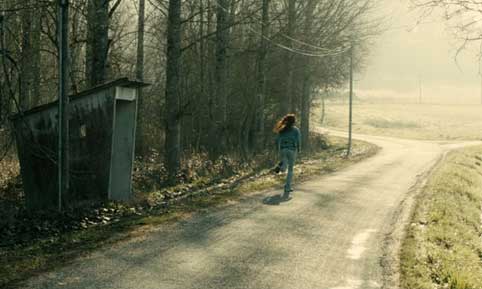 |
| A Moi Seule, by Frédéric Videau |
A Moi Seule
This ambivalent film about a girl who spent most of her life in captivity focuses on her struggles to find her footing in her newfound liberty, interspersed with flashbacks to the solitary life she shared with her kidnapper.
In the Land of Blood and Honey
The infamous Angelina Jolie directorial debut is part of the festival’s Out of Competition lineup and depicts a love story between a Bosnian woman – taken captive by the Serbian army – and a Serbian commander, set during the dissolution of former Yugoslavia. Many critics have criticised the film for being overly dramatic and one-sided. While we can’t comment on the latter, the dialogue being in Bosnian, with German subtitles (sie sprechen Englisch?), there were certainly some shocking – and moving – sequences in the film.
11 February
 |
| Marley, by Kevin Macdonald |
Dictado
One of the least popular competition films among the critics, this Spanish flick tells the story of Daniel, a man with repressed past secrets, brought back to life when he encounters an old friend.
Marley
Kevin Macdonald's latest documentary portrays the world-famous reggae musician from a different angle. The audience learns less about Bob Marley the musician, and more about Bob Marley the philanthropist. Despite being a tad too long, and putting Marley up on a pedestal, it's nonetheless a well-made and well-researched film, and clearly a labour of love.
12 February
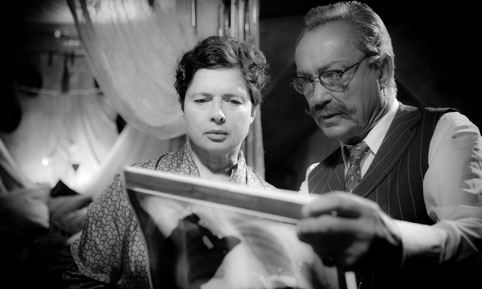 |
| Keyhole, by Guy Maddin |
Captive
Filipino director Brillante Mendoza's film goes for a documentary approach to portray the long periods of captivity of a group of hostages in the hands of a Muslim terrorist group. The director’s aim was to humanise both kidnapper and kidnapped, telling both sides of the story. The execution fell just a little short.
Keyhole
Part of the festival's Special selection, Canadian director Guy Maddin's film tells the surreal journey of Ulysses, a man who returns home with no memory and goes on an epic odyssey to reach his wife on the top floor of the house. The premise might sound simplistic, but the protagonist has to embark on a full-blown journey through the elusive corridors of the house, inhabited by both living and dead.
13 February
 |
| Jayne Mansfield's Car, by Billy Bob Thornton |
Jayne Mansfield's Car
Jumping between black comedy and straight-faced drama, this film uses the disfunctional dynamics of a Southern US family in 1969 to paint a bigger picture that wistfully reflects on war and its effects on different generations.
Flowers of War
In the context of a battle between China and Japan for the control of Chinese city, Namking, in 1937, Christian Bale stars as the improbable protector of a group of Chinese Catholic schoolgirls. The plot’s twists and turns – many of them irrelevant to the story – try every emotionally manipulative trick in the book to make the audience cry.
14 February
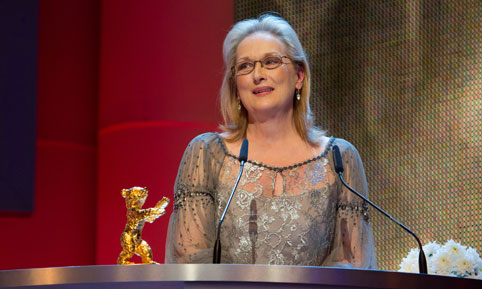 |
| Meryl Streep with the honorary Golden Bear |
The Iron Lady
Meryl Streep was awarded a lifetime achievement Golden Bear, with a special homage paid to her during the Berlinale. The roster of films cited include classics like Sophie's Choice, Kramer vs. Kramer and her most recent film, The Iron Lady.
Mommy is Coming
What else need we say, other than there *is* a double entendre in this film’s title. A short, tongue-in-cheek, farsical and – most of all – explicit comedy, it depicts the challenge of a lesbian couple to overcome emotional barriers, by having plenty of sex. Its openly gay director, Cheryl Dunye, said she wanted to contribute with a fun piece of queer cinema. It might have some fun moments but it's not for everyone. It’s not for anyone, really, other than the ones involved in making it.
15 February
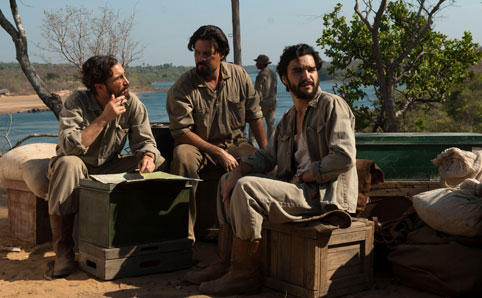 |
| Xingu, brazilian movie in Berlinale |
Xingu
Brazilian director Cao Hamburger’s film about the origins of Brazil's immense native Indian reservation Xingu, made the Panorama section of the festival. It’s a moving piece that chronicles not only the origins of the Xingu Reservation, but the personal trajectory of the men who sided with the Indians in a losing battle to save a culture from the crushing, and perhaps misconceived, notion of progress.
Haywire
Steven Soderbergh's latest effort, like his film Contagion, is another genre piece he knows won't be winning any awards anytime soon, but which he's clearly having fun directing. Too bad that in this case what comes across on screen seems emotionally detached from the project, which makes for a pretty bland film.
Keep the Lights On
Competing for the audience award, this film is a much more dramatic, beautifully-filmed and tasteful contribution to queer cinema than Mommy is Coming. It tells a very intimate story of the 9-year, long-suffering relationship between two men, unable to let go of each other.

